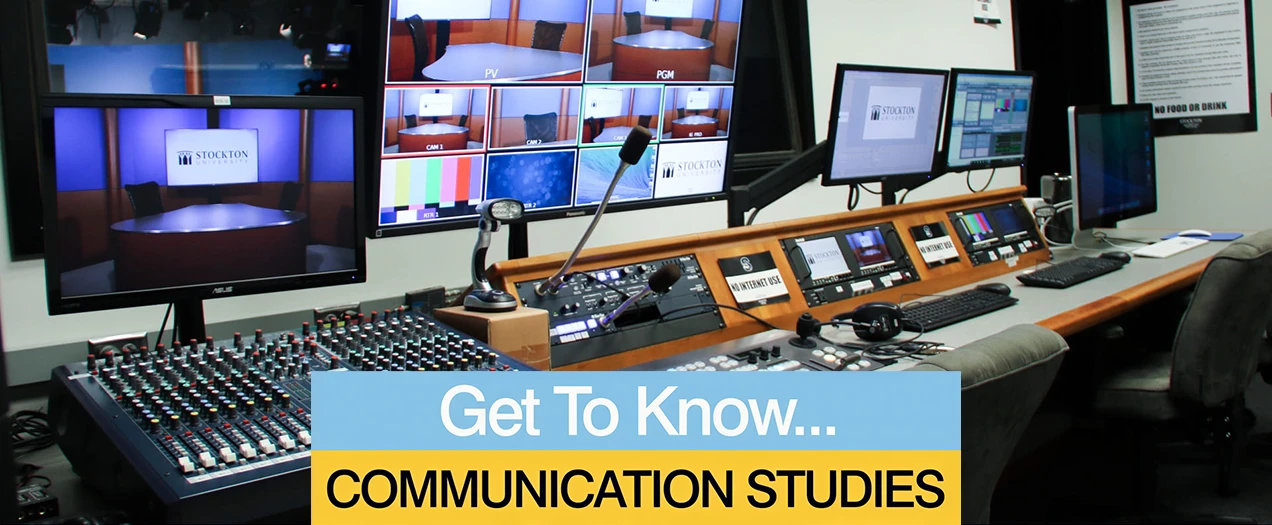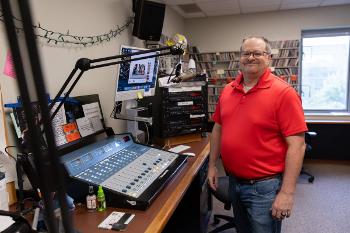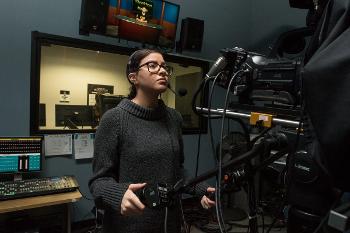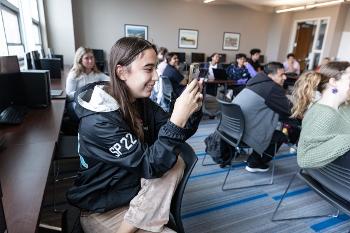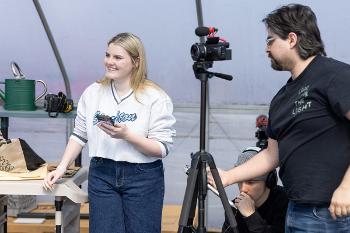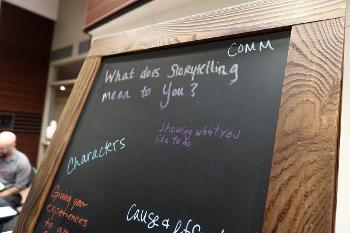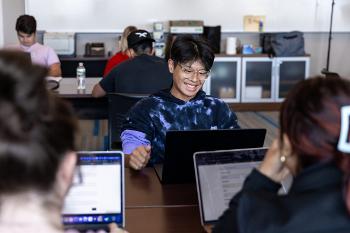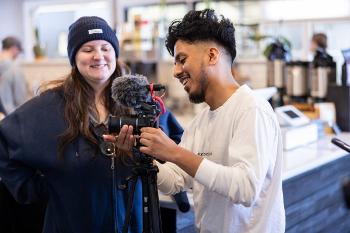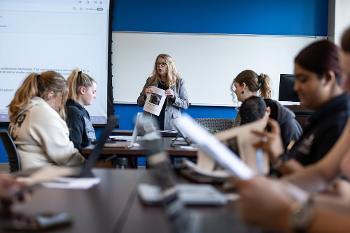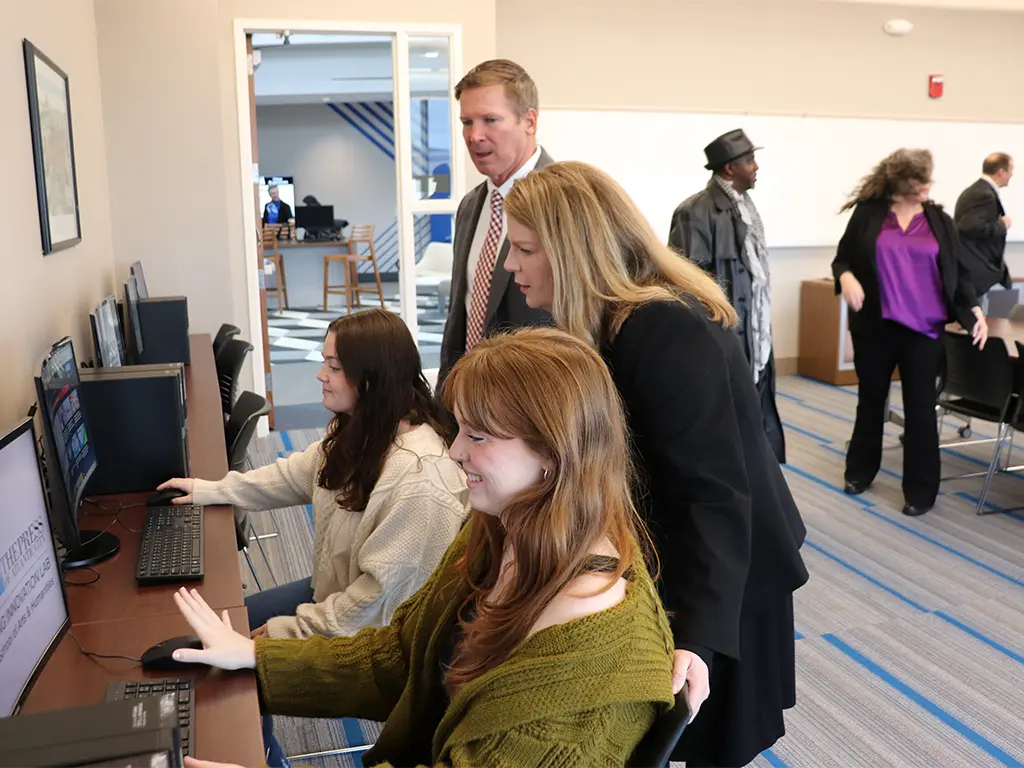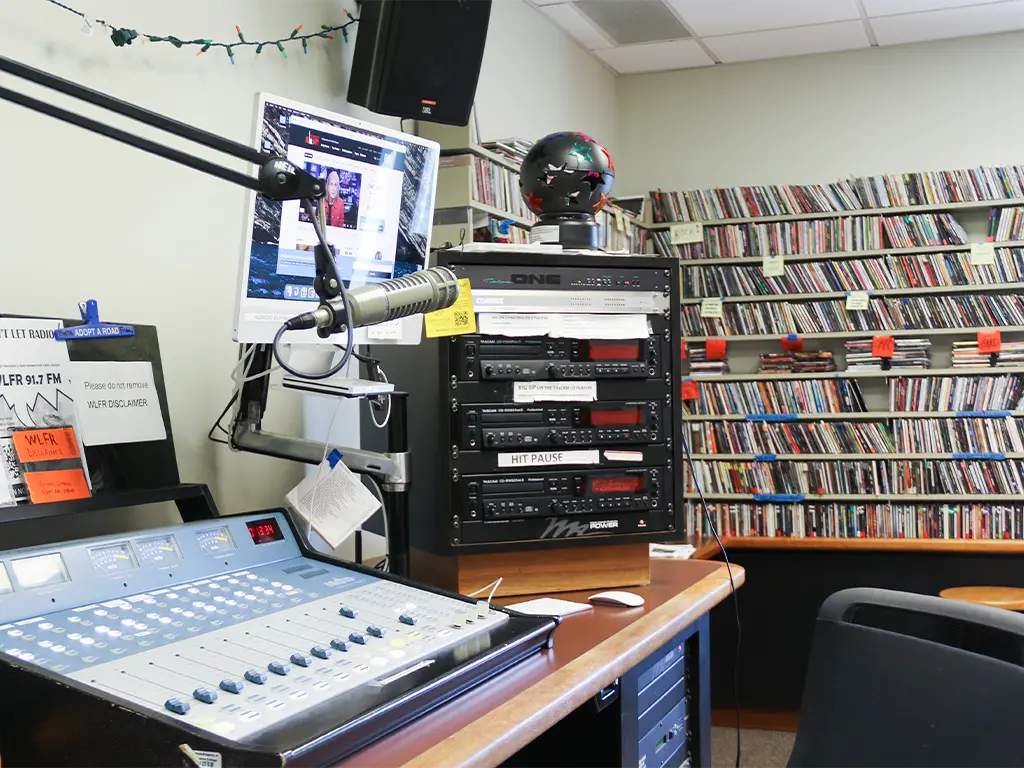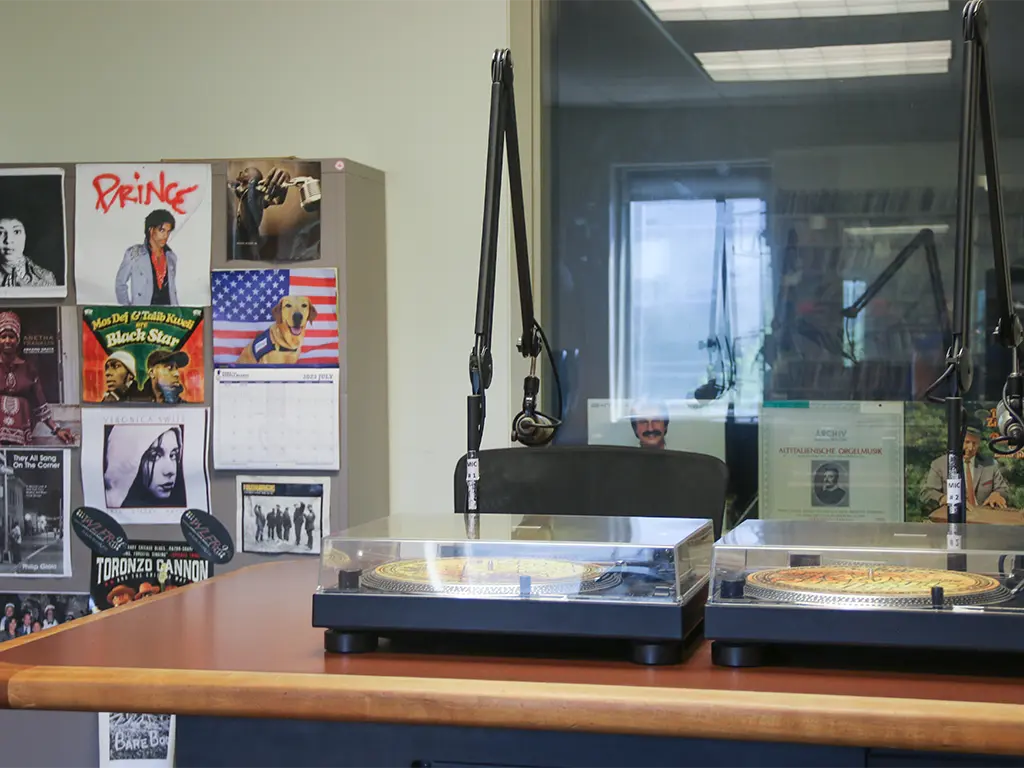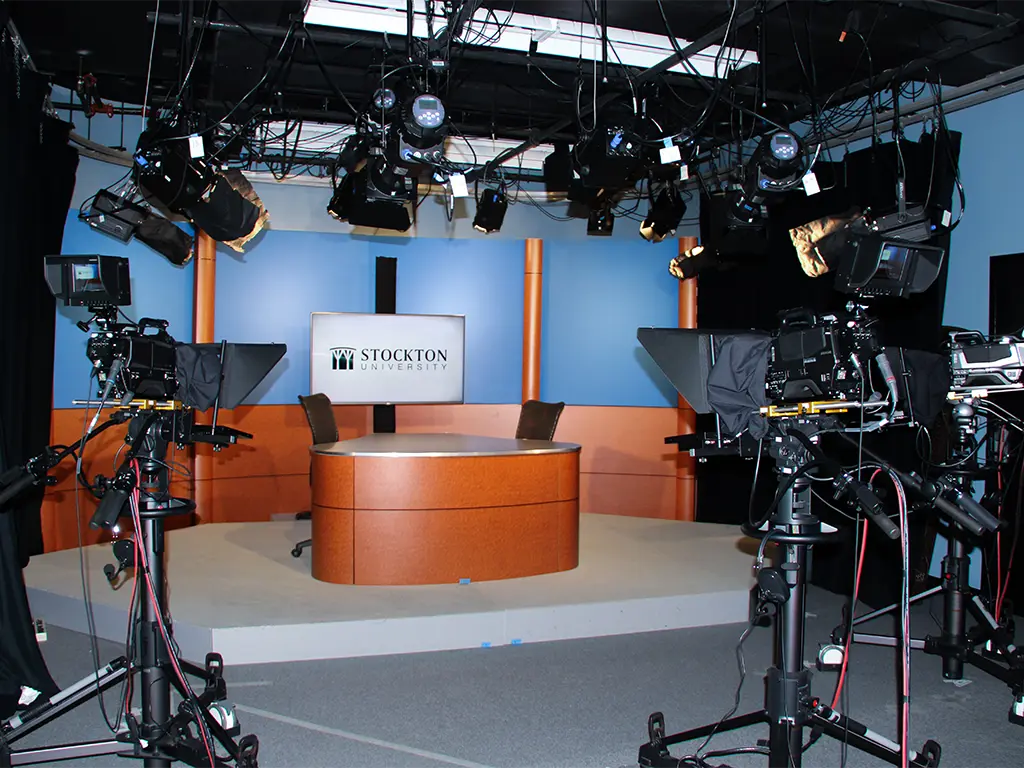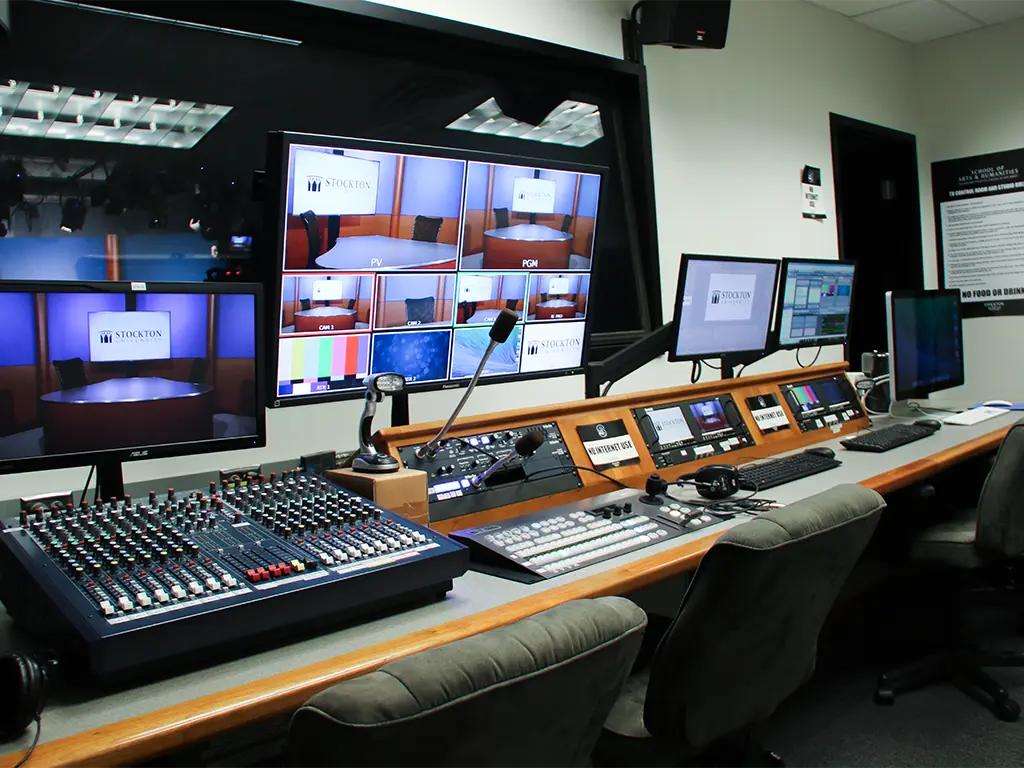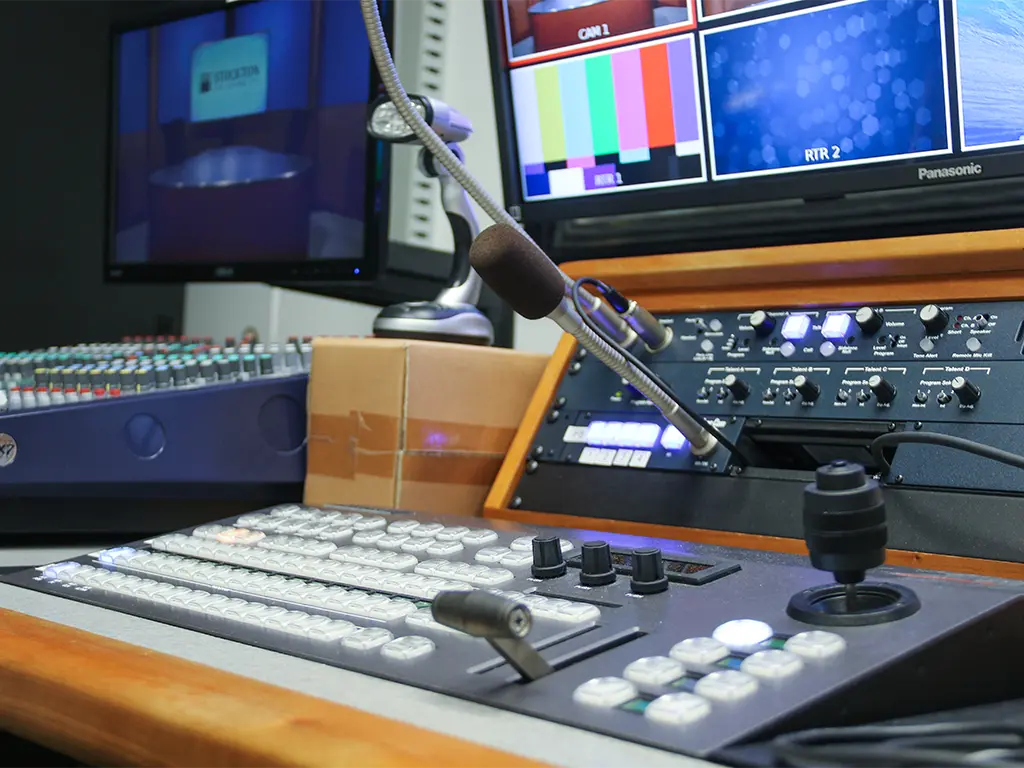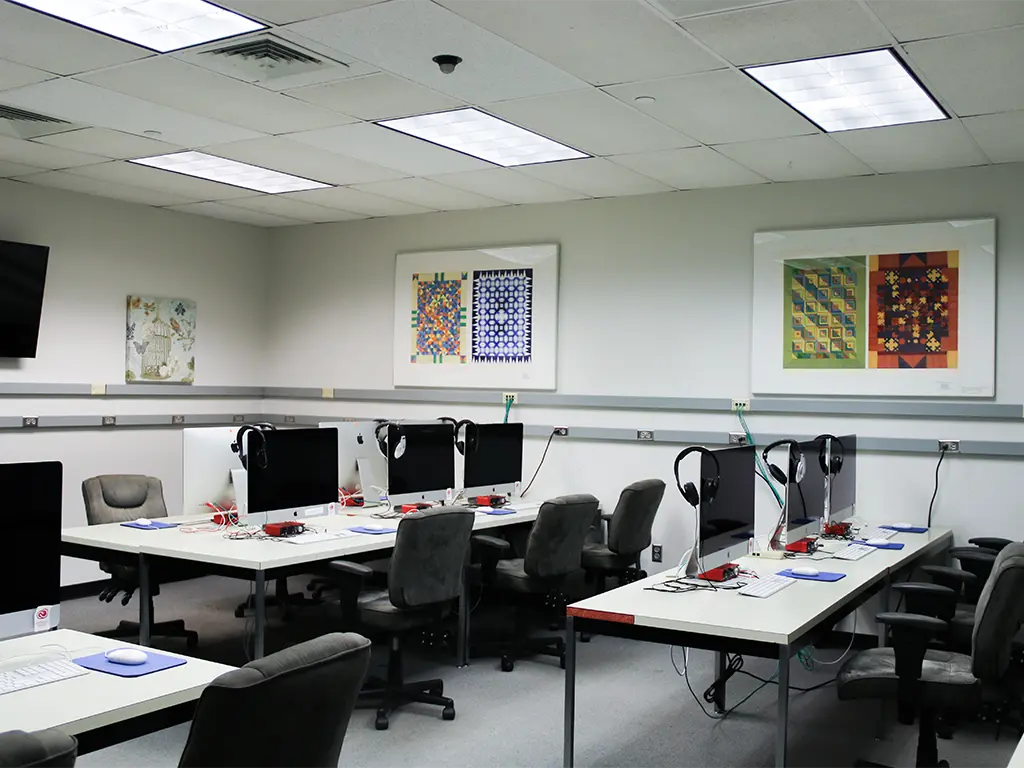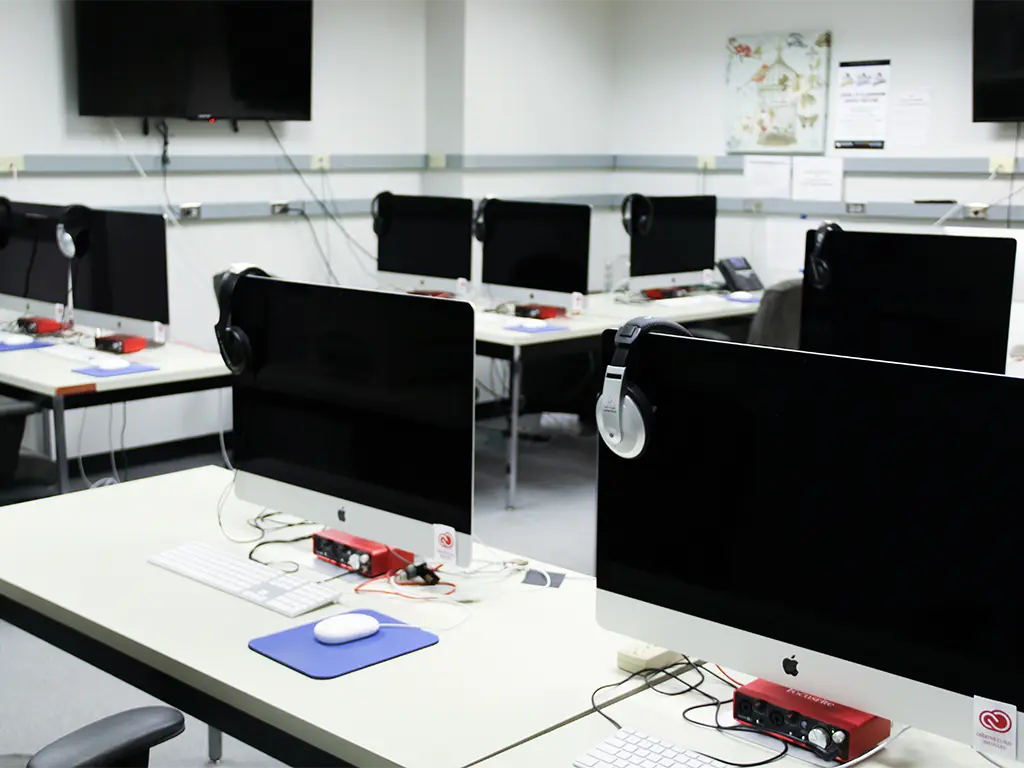Communication Studies
The Communication Studies Program prepares students for careers in journalism, media production, public relations, and advertising. Students engage in pre-professional training within a critical thinking framework. Through high impact and experiential learning opportunities, students develop skills that are in-demand and adaptable, preparing them for success in an ever-evolving world.
About the Program
The program supports students from all backgrounds, such as first-generation students, transfer students, and adult learners, and strives to remove barriers to achievement, engagement, and professional access. Faculty foster rigorous analysis, imaginative problem-solving, and thoughtful production across written, oral, visual, and digital communication forms. The program values applied practice as these experiences deepen learning and prepare graduates to thrive as professionals.
The program in Communication Studies is open to any student with an interest in the discipline. Students wishing to major in the program are encouraged to declare their intentions no later than the beginning of their junior year. Intended majors are expected to consult with a Communication Studies faculty member, who will explain the nature of the program and its specific requirements. (Students must already have credit for, or be enrolled in, COMM 1201 Introduction to Mass Communication to declare the major.)
Program Statement in Support of Black LivesAlumni Success
After graduation in 2021 from the Communication Studies program, Emily moved on to become a content creator for FOX 29 News in Philadelphia. Emily got involved with Mighty Writers, a nonprofit based in Philadelphia whose mission is to teach kids to think clearly and write with clarity. Emily now works full-time as a Social Media Manager for Mighty Writers.
"I will forever be grateful for all the opportunities that were presented to me during my time at Stockton."

Communication Studies '21
Ky Carlin graduated from the Communication Studies program in 2016 where his concentration was Media Production. Ky is currently the Senior Editor at NBA Wires.
"If it means something to you, you’ll find a way to get it done. If it doesn’t, you’ll find an excuse as to why you couldn’t do it."

Communication Studies '16
During my time at Stockton, the Communications program opened many doors that led to where I am today. While in the program, I gained experience from internships with the Community TV Partnership, Fox 29, and NBC Sports Philadelphia. Currently, I am working at NFL Films in our Film Lab as a Film Archive Assistant.

Communication Studies '18
- Communication Skills
Communication Studies is a growing and rewarding field of study. Communication Studies at Stockton is a dynamic multidisciplinary program exploring a wide range of interests in contemporary global and popular culture, including radio and television, advertising and public relations, digital communication, film and cinema, visual communication, international communication and more. The thread that runs through all of our tracks, and hence the tie that binds the program, is the dual premise that a Stockton Communication Studies graduate should be able to: 1) Critically interrogate media messages from a variety of angles, and 2) Produce effective media messages in a variety of contexts. These two premises underscore the core classes that all of our majors are required to take. The specific applications of these premises are honed in the track-specific curricula. - Adapting to Change
Our program prepares students for careers in diverse fields. In recent years, our alumni have gone on to work at The Press of Atlantic City, ESPN, MTV, Clear Channel Radio, Equity Communication, Suasion Communications Group, NBC40 WMGM-TV, and a host of other companies. - Program Competence
A collection of scholars, artists, and media professionals, Communication Studies Program faculty are engaged in developing a rigorous program of study in the liberal arts tradition. The program strives for graduates who are able to think critically about media messages, and to apply varied and interrelated media studies concepts (including media literacy, critical media analysis, cultural studies, media writing, and media production) toward the effective production media messages. - Teamwork & Collaboration
Our students get hands-on experience right on campus, with opportunities to participate in Stockton Student Television (SSTV), the Stockton radio station (WLFR, 91.7 FM), the Community TV Partnership, and Stockton’s chapter of the Public Relations Student Society of America (PRSSA). They also gain real-world production experience interning for companies such as CNN, MTV, and NBC; they gain PR experience working for various local politicians and also with various PR firms. - Creativity & Innovation
Our students work with state-of-the-art equipment and facilities, such as our HDTV Studio.
Curriculum
Program Organization
The Communication Studies Program consists of three concentrations— Journalism & Community Storytelling, Media Production, and Public Relations & Advertising. In each concentration, students develop the skills of professionals in their field while learning to think critically about their practice and the media they encounter in the world around them. Students may also take classes in other Communication Studies concentrations as cognates, enhancing their skills and broadening their knowledge base. All students take core program courses in media writing, communication theory, and a senior seminar, as well as a professional development course and an on-campus or off-campus internship.
Program Courses: 40 credits
Core Required Courses for all majors:
24 credits (five courses)
- COMM 1201 - Introduction to Mass Communication (4 credits)
- COMM 2103 - Writing for the Media (4 credits)
- COMM 3100 - Professional Development (4 credits)
- COMM 3200 - Theories of Mass Communication (4 credits)
- COMM 4601 - Communication Senior Seminar (4 credits)
- Communication Internship (4 credits)
Choose from one of the following internship options:
- COMM 3929 - Archives, Editing, and Publishing Internship
- COMM 4901 - Communication Internship
- COMM 4902 - WLFR Internship
- COMM 4906 - Community TV Partnership Internship
- COMM 4907 - Social Media Internship
- COMM 4909 - Stories of Atlantic City Internship
- COMM 4912 - Radio Management Internship
Journalism & Community Storytelling Concentration:
20 credits total
Choose 4 credits from:
- COMM 2211 - Media Criticism (4 credits)
- COMM 2304 - Principles of Journalism (4 credits)
- COMM 2101 - Communication Studies Lab (1 credit)
Choose two (8 credits):
- COMM 3203 - Communication Research Methods (4 credits)
- COMM 3306 - Race, Gender and Media (4 credits)
- COMM 3309 - Media, Civil Rights & Social Change (4 credits)
- COMM 3312 - Media in Times of War (4 credits)
- COMM 3314 - Journalism News Writing (4 credits)
- COMM 3400 - Film Theory and Criticism (4 credits)
- COMM 3604 - Restorative Journalism (4 credits)
- COMM 4402 - Reporting & Interviewing (4 credits)
Choose two (8 credits):
- COMM 2211 - Media Criticism (4 credits)
- COMM 2204 - Media, Culture and Society (4 credits)
- COMM 2207 - Special Topics in Media Studies (4 credits)
- COMM 2210 - Digital Storytelling (4 credits)
- COMM 2305 - Media Law and Ethics (4 credits)
- COMM 2400 - Computer-Mediated Communication (4 credits)
- COMM 2408 - News Media & Politics (4 credits)
- COMM 2409 - Television & Popular Culture (4 credits)
- COMM 2412 - Media Aesthetics (4 credits)
- COMM 2413 - Metaphysics of Film (4 credits)
- COMM 2414 - African Americans on Television (4 credits)
- COMM 3301 - Communication Technologies (4 credits)
- COMM 3303 - International Communication (4 credits)
- COMM 3306 - Women, Minorities and the Media (4 credits)
- COMM 3309 - Media, Civil Rights & Social Change (4 credits)
- COMM 3400 - Film Theory and Criticism (4 credits)
- COMM 3312 - Media in Times of War (4 credits)
- COMM 3314 - Journalistic Writing (4 credits)
- COMM 3604 - Restorative Journalism (4 credits)
*Students with an interest in Journalism should take COMM 2304 and COMM 3314; and
should consider COMM 3604 and COMM 2210.
**In consultation with their preceptor, students in the Journalism & Community Storytellingtrack may opt to take one of their track elective courses from the Media Production
or Public Relations tracks.
Students are required to have four cognate courses (16 credits). At least one cognate course must be taken at the 3000 or 4000 level. Cognates can come from the following areas:
ARTV, THTR, COMM, LANG, LITT, POLS, AFRI, (or other related areas as approved by your
preceptor).
Students may also use the following classes toward their Journalism & Community Storytelling cognate:
ANTH 2152, ANTH 2602, ANTH 2645, ANTH 3315, GEN 2105, GEN 2110, GEN 2153, GEN 2155, GEN 2248, GEN 2343, GEN 3146, GEN 3163, GEN 3524, GAH 1124, GAH 1227, GAH 1294, GAH 1724, GAH 2105, GAH 2160, GAH 2180; GAH 2233, GAH 2237, GAH 2257, GAH 2279, GAH 2289, GAH 2335, GAH 2339, GAH 2357, GAH 2370, GAH 2372, GAH 2412, GAH 2298, 3109, GAH 3130, GAH 3203, GAH 3207, GAH 3213, GAH 3230, GAH 3248, GAH 3306, GAH 3307, GAH 4303, GAH 4306, GIS 3668, GIS 4625, GIS 4630, GIS 4634, GNM 2139, GNM 2316, GNM 2486, GSS 2150, GSS 2152, GSS 2173, GSS 2274, GSS 2428, GSS 3102, GSS 3105, GSS 3144, GSS 3154, GSS 3282, GSS 3295, GSS 3618, GSS 3795, POLS 2190, POLS 2245, POLS 3235, POLS 3250, POLS 3625, POLS 3658, SOCY 2355, SOCY 2370, SOCY 2642, SOCY 2652, SOCY 3104, SOCY 3211, SOCY 3615, SOCY 3628, SOCY 3678
NOTE: A minimum grade of C or better is required for all program and cognate courses counted toward the 64 program and cognate credits required for graduation.
25 % of all the courses a student takes at Stockton must be General Studies courses.
For all first-year students and transfer students with fewer than 64 credits (B.A.
degree), the following courses are required.
General Arts and Humanities (GAH) — 8 credits
General Interdisciplinary (GEN) — 4 credits
General Integration and Synthesis (GIS)* — 4 credits
General Natural Science and Mathematics (GNM) — 8 credits
General Social Science (GSS) — 8 credits
*Must be taken in junior or senior year
NOTE: No more than 16 credits in any General Studies course may be applied toward the B.A. degree.
Arts (A)
Historical Conciousness (H)
International/Multicultural (I)
1 W1 course (any level)
1 W1 or W2 course (any level)
1 W1 or W2 course 3000-level
NOTE: W2 courses must be taken at Stockton University.
1 Q1 course (any level)
1 Q1 or Q2 course (any level)
NOTE: Q2 courses must be taken at Stockton University.
1 R1 course (any level)
Reminder: “The student is responsible for ensuring that all graduation requirements are met”
(Bulletin). It is important that you consult with your preceptor and/or the Center
for Academic Advising on a regular basis.
All Bachelor’s Degree programs require a minimum of 128 credits and a 2.00 cumulative
G.P.A.
For more information on the Communication Studies program, please consult the Academic Bulletin.
Course descriptions and prerequisite information may be found in the Catalog of Courses.
Program Courses: 40 credits
Core Required Courses for all majors:
24 credits (five courses)
- COMM 1201 - Introduction to Mass Communication (4 credits)
- COMM 2103 - Writing for the Media (4 credits)
- COMM 3100 - Professional Development (4 credits)
- COMM 3200 - Theories of Mass Communication (4 credits)
- COMM 4601 - Communication Senior Seminar (4 credits) or
Practicum (4 credits) - Communication Internship (4 credits)
Choose from one of the following internship options:
- COMM 3929 - Archives, Editing, and Publishing Internship
- COMM 4901 - Communication Internship
- COMM 4902 - WLFR Internship
- COMM 4906 - Community TV Partnership Internship
- COMM 4907 - Social Media Internship
- COMM 4909 - Stories of Atlantic City Internship
- COMM 4912 - Radio Management Internship
Media Production Concentration:
20 credits total
- COMM 2412 - Media Aesthetics (4 credits) required
Choose 4 courses (16 credits) from the following:
- COMM 2209 - Special Topics in Media Production (4 credits)
- COMM 2210 - Digital Storytelling (4 credits)
- COMM 2400 - Computer-Mediated Communication (4 credits)
- COMM 2401 - Audio I (4 credits)
- COMM 2402 - Video Production (4 credits)
- COMM 2403 - Television Production (4 credits)
- COMM 2407 - Introduction to Editing (4 credits)
- COMM 3350 - Documentary Production (4 credits)
- COMM 3351 - Experimental Video Production (4 credits)
- COMM 3401 - Audio II
- COMM 3501 - Sports Broadcasting (4 credits)
- COMM 4200 - Steadicam: Art of the Moving Camera (4 credits)
- COMM 4300 - Practicum (4 credits)
- COMM 4401 - Podcasting (4 credits)
*Students with an interest in Journalism should take COMM 2304 and COMM 3314; and
should consider COMM 3604 and COMM 2210.
**In consultation with their preceptor, students in the Journalism & Community Storytellingtrack may opt to take one of their track elective courses from the Media Production
or Public Relations tracks.
Students are required to have five cognate courses (20 credits). At least one cognate course must be taken at the 3000 or 4000 level.
Cognates can come from the following areas:
ARTV, DANC, MUSC, THTR, LANG, LITT, PHIL, AFRI 2118, AFRI 2123, AFRI 3135, AFRI 3148, ANTH 2645, GAH 1124, GAH 1226, GAH 1227, GAH 1228, GAH 1294, GAH 1724, GAH 2105, GAH 2159, GAH 2160, GAH 2233, GAH 2234, GAH 2237, GAH 2257, GAH 2279, GAH 2289, GAH 2292, GAH 2294, GAH 2298, GAH 2370, GAH 2372, GAH 2412, GAH 3130, GAH 3203, GAH 3207, GAH 3213, GAH 3230, GAH 3306, GAH 3307, GAH 3308, GAH 3310, GAH 4303, GAH 4306, GEN 2124, GEN 2153, GEN 2260, GEN 2343, GIS 4618, GIS 4625, GIS 4664, GIS 3668, GNM 2139, GNM 2157, GNM 2316, GSS 2152, GSS 2173, GSS 3102, GSS 3105, GSS 3154, GSS 3282, GSS 3295, GSS 3795, POLS 3658, SOCY 2642, SOCY 3104, SOCY 3211, SOCY 3615, SOCY 3628, SOCY 3678, WASH 3300
NOTE: A minimum grade of C or better is required for all program and cognate courses counted toward the 64 program and cognate credits required for graduation.
25 % of all the courses a student takes at Stockton must be General Studies courses.
For all first-year students and transfer students with fewer than 64 credits (B.A.
degree), the following courses are required.
General Arts and Humanities (GAH) — 8 credits
General Interdisciplinary (GEN) — 4 credits
General Integration and Synthesis (GIS)* — 4 credits
General Natural Science and Mathematics (GNM) — 8 credits
General Social Science (GSS) — 8 credits
*Must be taken in junior or senior year
NOTE: No more than 16 credits in any General Studies course may be applied toward the B.A. degree.
Arts (A)
Historical Conciousness (H)
International/Multicultural (I)
1 W1 course (any level)
1 W1 or W2 course (any level)
1 W1 or W2 course 3000-level
NOTE: W2 courses must be taken at Stockton University.
1 Q1 course (any level)
1 Q1 or Q2 course (any level)
NOTE: Q2 courses must be taken at Stockton University.
1 R1 course (any level)
Reminder: “The student is responsible for ensuring that all graduation requirements are met”
(Bulletin). It is important that you consult with your preceptor and/or the Center
for Academic Advising on a regular basis.
All Bachelor’s Degree programs require a minimum of 128 credits and a 2.00 cumulative
G.P.A.
For more information on the Communication Studies program, please consult the Academic Bulletin.
Course descriptions and prerequisite information may be found in the Catalog of Courses.
Program Courses: 40 credits
Core Required Courses for all majors:
24 credits (five courses)
- COMM 1201 - Introduction to Mass Communication (4 credits)
- COMM 2103 - Writing for the Media (4 credits)
- COMM 3100 - Professional Development (4 credits)
- COMM 3200 - Theories of Mass Communication (4 credits)
- COMM 4601 - Communication Senior Seminar (4 credits) or
Practicum (4 credits) - Communication Internship (4 credits)
Choose from one of the following internship options:
- COMM 3929 - Archives, Editing, and Publishing Internship
- COMM 4901 - Communication Internship
- COMM 4902 - WLFR Internship
- COMM 4906 - Community TV Partnership Internship
- COMM 4907 - Social Media Internship
- COMM 4909 - Stories of Atlantic City Internship
- COMM 4912 - Radio Management Internship
Public Relations and Advertising Concentration:
20 credits total
Courses must be taken sequentially:
- COMM 2301 - Introduction to Public Relations (4 credits) required course
- Choose one preparatory course (4 credits):
COMM 2307 - Quantitative Methods in PR
COMM 2405 - Introduction to Advertising
COMM 3305 - Public Relations Ethics - Choose two advanced courses (8 credits):
COMM 3302 - Advanced Public Relations
COMM 3304 - PR and Advertising Design
COMM 3303 - International Communication
COMM 3310 - Global Public Relations
COMM 3311 - PR and Advertising Copywriting
COMM 3315 - PR Crisis Communication
COMM 3316 - Advertising and PR Law - Choose one additional course (4 credits):
COMM 2208 - Special Topics in PR & Advertising
COMM 2307 - Quantitative Methods in PR Research
COMM 2405 - Introduction to Advertising
COMM 2406 - Business and Professional Presentation
COMM 3302 - Advanced Public Relations
COMM 3303 - International Communication
COMM 3304 - PR and Advertising Design
COMM 3305 - Public Relations Ethics
COMM 3310 - Global Public Relations
COMM 3311 - PR and Advertising Copywriting
COMM 3315 - PR Crisis Communication
COMM 3316 - Advertising and PR Law
*Students with an interest in Journalism should take COMM 2304 and COMM 3314; and
should consider COMM 3604 and COMM 2210.
**In consultation with their preceptor, students in the Journalism & Community Storytelling track may opt to take one of their track elective courses from the Media Production
or Public Relations tracks.
Students are required to have five cognate courses (20 credits). At least one cognate course must be taken at the 3000 or 4000 level.
Cognates can come from the following areas:
ACCT, ARTV, COMM, BSNS, ECON, FINA, HOSP/HTMS, INTL, LANG, LITT, MGMT, MKTG, ANTH 3315, COMM 2400, GAH 2105, GAH 2160, GAH 2164, GAH 2180, GAH 2339; GAH 2372, GAH 3203, GAH 3213, GAH 3248; GAH 3306; GAH 4303, GEN 2105, GEN 2110, GEN 2153, GEN 2155, GEN 2343, GEN 3146, GEN 3163, GIS 3346, GIS 3348, GIS 3668, GIS 3692, GIS 3748, GIS 4625, GIS 4630, GSS 2152, GSS 2150, GSS 2153, GSS 2173, GSS 2274, GSS 2370, GSS 3111, GSS 3144, GSS 3166, GSS 3168, GSS 3646, GSS 3768, POLS 3235, POLS 3250, POLS 3625, PUBH 2315, PUBH 2450 , WASH 3300
NOTE: A minimum grade of C or better is required for all program and cognate courses counted toward the 64 program and cognate credits required for graduation.
25 % of all the courses a student takes at Stockton must be General Studies courses.
For all first-year students and transfer students with fewer than 64 credits (B.A.
degree), the following courses are required.
General Arts and Humanities (GAH) — 8 credits
General Interdisciplinary (GEN) — 4 credits
General Integration and Synthesis (GIS)* — 4 credits
General Natural Science and Mathematics (GNM) — 8 credits
General Social Science (GSS) — 8 credits
*Must be taken in junior or senior year
NOTE: No more than 16 credits in any General Studies course may be applied toward the B.A. degree.
Arts (A)
Historical Conciousness (H)
International/Multicultural (I)
1 W1 course (any level)
1 W1 or W2 course (any level)
1 W1 or W2 course 3000-level
NOTE: W2 courses must be taken at Stockton University.
1 Q1 course (any level)
1 Q1 or Q2 course (any level)
NOTE: Q2 courses must be taken at Stockton University.
1 R1 course (any level)
Reminder: “The student is responsible for ensuring that all graduation requirements are met”
(Bulletin). It is important that you consult with your preceptor and/or the Center
for Academic Advising on a regular basis.
All Bachelor’s Degree programs require a minimum of 128 credits and a 2.00 cumulative
G.P.A.
For more information on the Communication Studies program, please consult the Academic Bulletin.
Course descriptions and prerequisite information may be found in the Catalog of Courses.
Journalism@Stockton
There are more student-centered storytelling opportunities on and off campus.
We offer new platforms and methods to engage and produce impactful content, from reporting and writing to getting published.
Why Now? Our democracy depends on journalism. We need truth-tellers who are ethical and honest. Consumers need to know what good journalism is. It will make you a better analyst, evaluator, and practitioner.
To learn more, contact Dr. Huixin Deng, Dr. Christina Morus, or Professor Toby Rosenthal.
Faculty
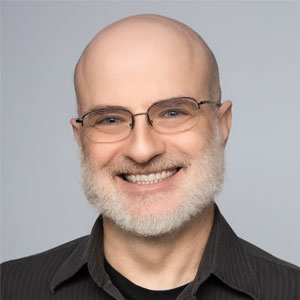
Jeremy Newman
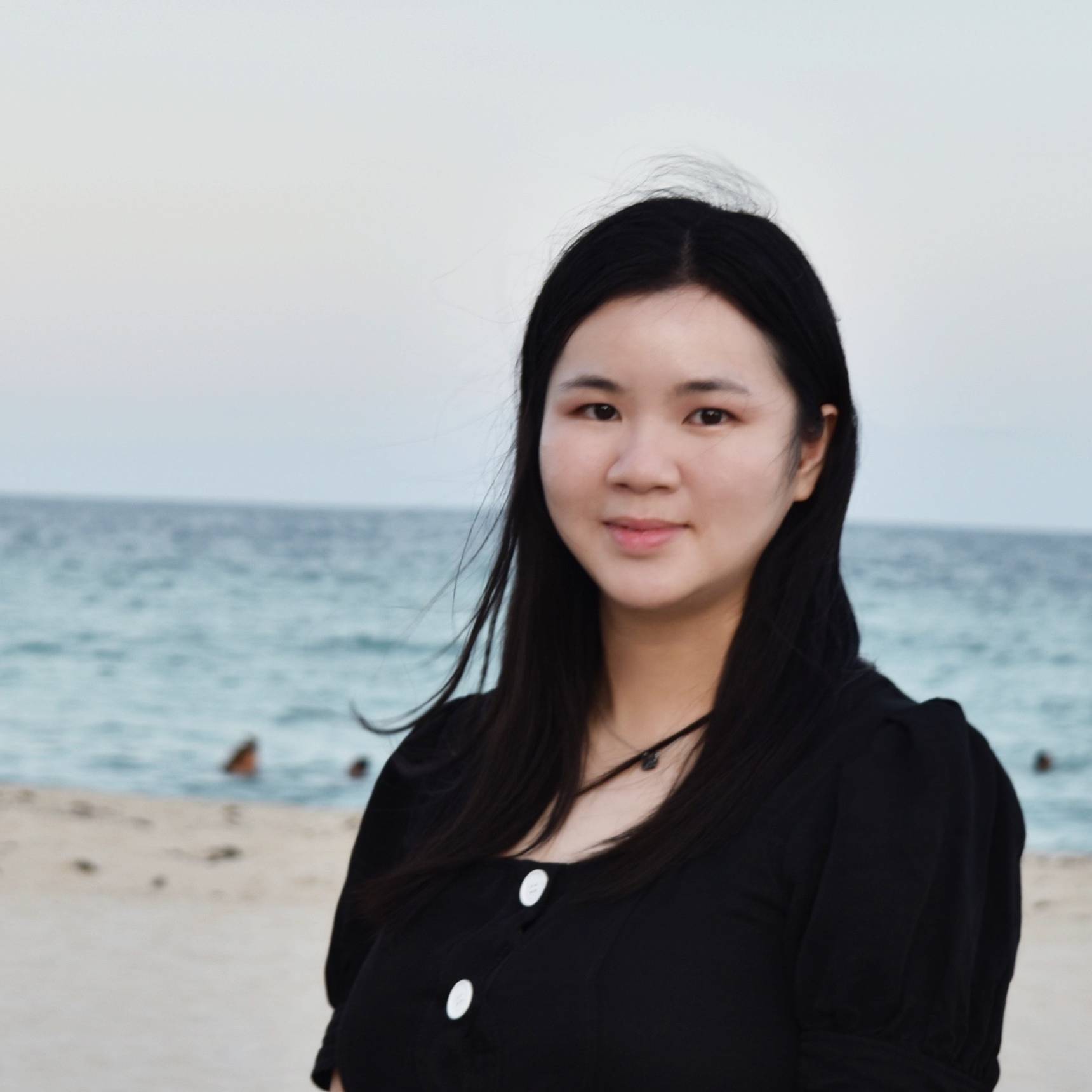
Huixin Deng
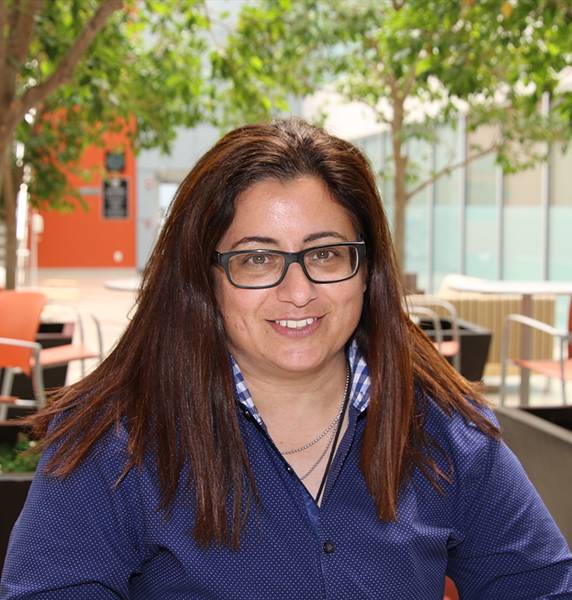
Joe’l Ludovich

Christina M. Morus
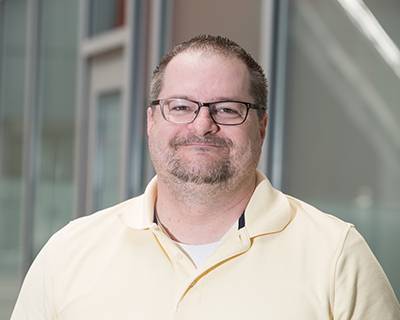
Chad Roberts
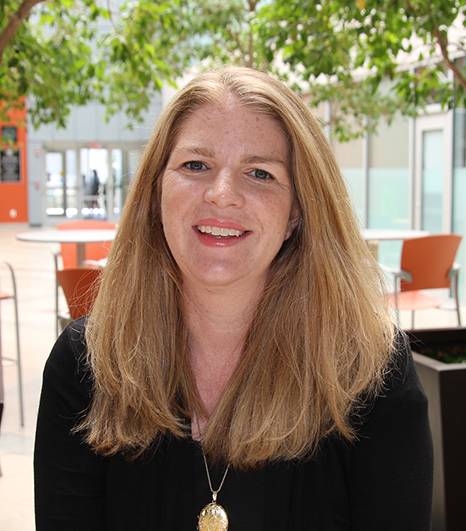
Toby Rosenthal
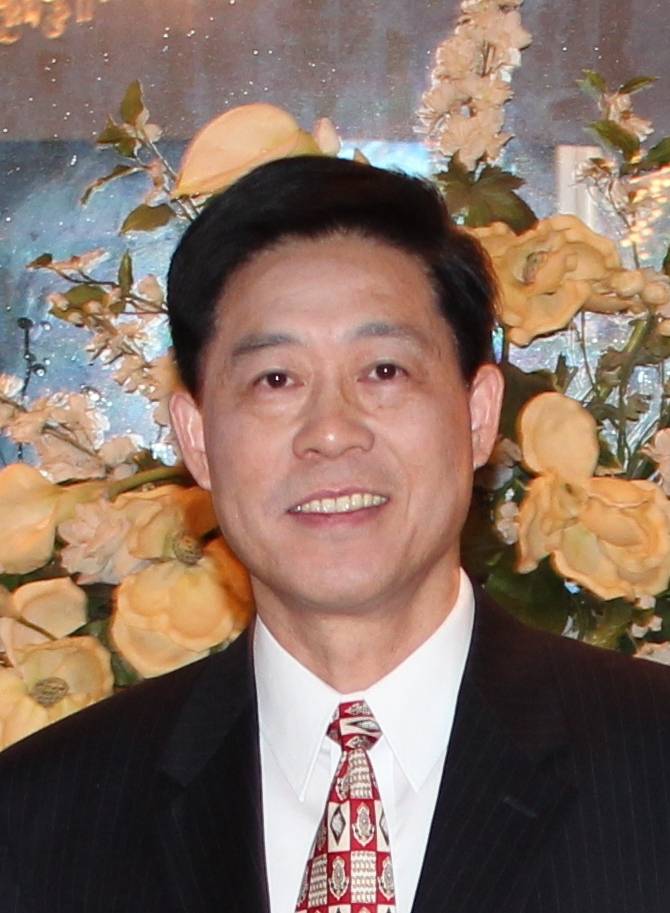


Associated Faculty

Donnetrice C. Allison
Communication Studies Staff
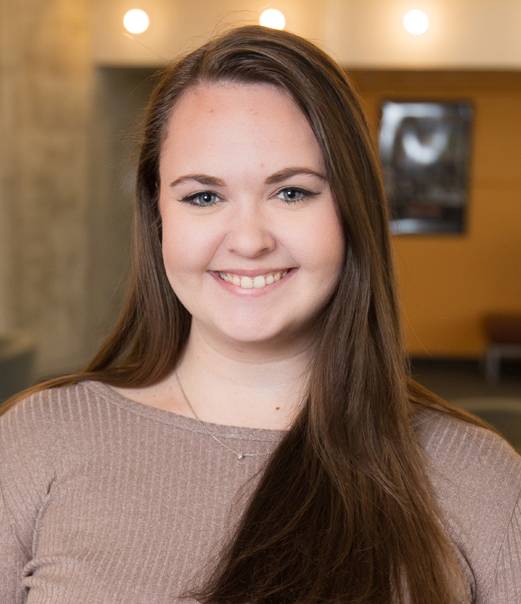
Jordan Knapp

Michael Zubrzycki
Adjunct Faculty



Netesha Peterson
Internships & Careers
Students pursuing degrees in Communication Studies may prepare themselves for careers in journalism, media production, and public relations and advertising, as well as opportunities in administration, civil service, consulting, event planning, government, marketing, and teaching. Majors who wish to pursue graduate school in Communication Studies or a related area of study should inform their preceptors of their plans as early as possible.
The semester before you want to enroll in the internship, begin the following process:
-
Create a Handshake account.
Handshake is where all of the Stockton-vetted current internship and job listings are posted.
- Feel free to pursue opportunities not listed, but it’s best to first talk to the Internship Coordinator.
Some internship application processes take longer than others.
-
Create a Resume.
- Go on the CED website
- ○ Search resume resources.
- Create your own resume.
- Make an appointment to take your resume to CED for revisions and packaging.
- Go on the CED website
-
Set up a meeting with the internship coordinator.
- The paperwork for an internship can take many weeks to go through Stockton’s clearances.
-
Once you’re hired, paperwork must be completed by all parties.
-
YOU MUST ENROLL IN COMM 4901 BEFORE DROP/ADD ENDS.
Engagement Opportunities
Students may obtain pre-professional experiences through internships with local and regional corporate, media, and non-profit organizations. The proximity of Stockton University to Atlantic City and Philadelphia makes it possible to intern in journalism, media production, and public relations and advertising.
Communication Studies skills also apply to internships in arts and culture, government, health care, public affairs, and sports. Students may opt for an on-campus internship with Stories of AC, TV Community Partnership, or the university radio station WLFR. Hands-on journalism experience is available through an internship with the Press of Atlantic City. An internship is required in Communication Studies, and students may take up to two internships for credit. Students may also join the award-winning Public Relations Student Society of America (PRSSA) chapter or the growing Society of Professional Journalists(SPJ) chapter, host their own radio show on WLFR, or contribute to Stockton University’s student-run newspaper, The Argo.

Community Reporting Innovation Lab (AC Campus)
Community Reporting Innovation Lab (CRIL) is designed as a place-based learning environment that will equally value community partners and student learning. Different from any lab currently established at Stockton University, it is a space that includes computers, reporting equipment and meeting areas. These are available for legacy media organizations, community partners and students. Accessible to the staff from The Press of Atlantic City, and additional community storytellers, it is a space capable of hosting a daily editorial meeting as well as a place to pitch stories, work on editing a video or record a podcast. Students will have the opportunity to work shoulder-to-shoulder with professional writers. As needed, the lab will transform into a nighttime newsroom where stories are filed on deadline and breaking news is digested and curated for the next edition. Acting as an additional access point for reporting and collaborating with Atlantic City residents, this lab is an exciting space dedicated to innovation and cutting-edge trends in journalism education and community reporting.
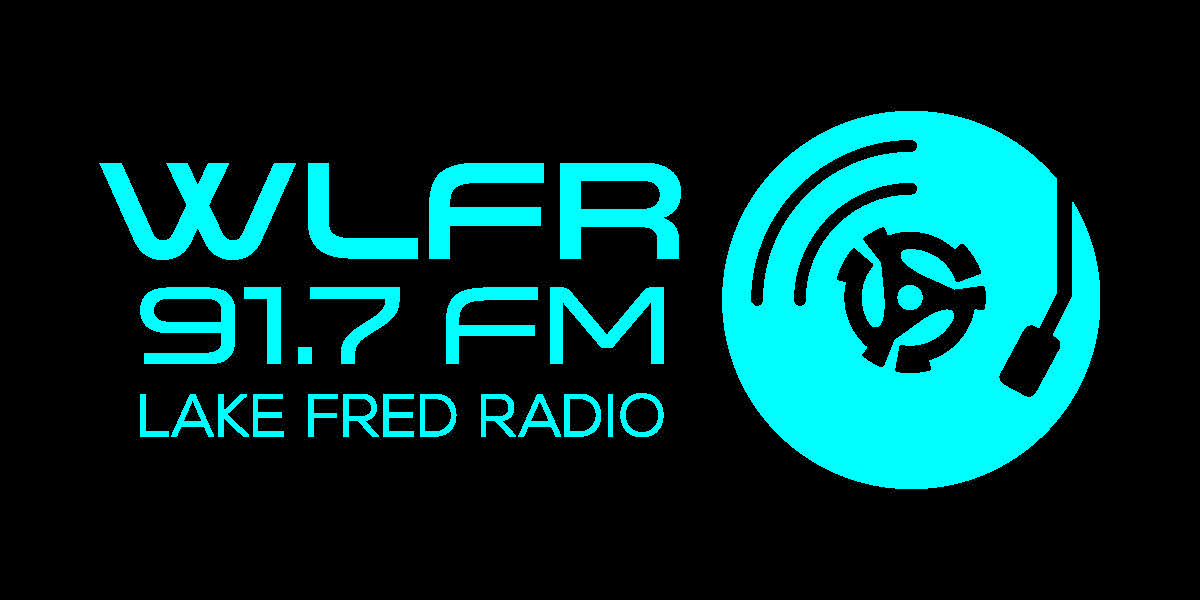
WLFR
WLFR 91.7 FM has been in operation for more than 30 years! We take pride in our diversity of music and shows and strive to bring you programming not found on commercial stations. Students can participate in the WLFR Internship to gain handson experience on the air as well as behind the scenes. Students will also learn about the day-to-day operations of a radio station. WLFR can be found on the web at www.wlfr.fm.
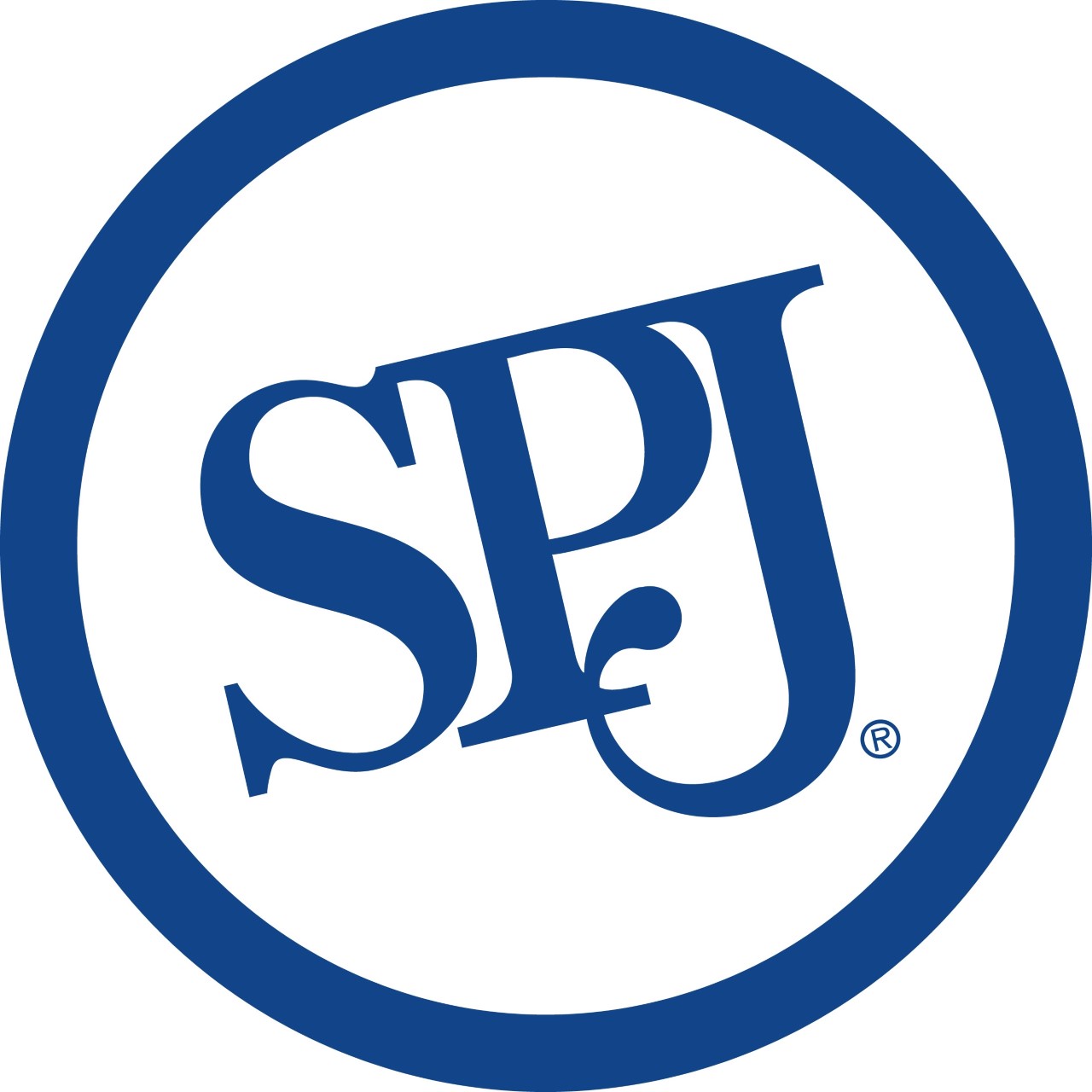
Society of Professional Journalists - Collegiate Institutional Member
Stockton's Communication Studies Program is a Collegiate Institutional Member of the Society of Professional Journalists. The Society of Professional Journalists is the nation’s broad-based journalism organization, dedicated to encouraging the free practice of journalism and stimulating high standards of ethical behavior. The COMM Program hosts innovative student workshops each semester to support professional development.
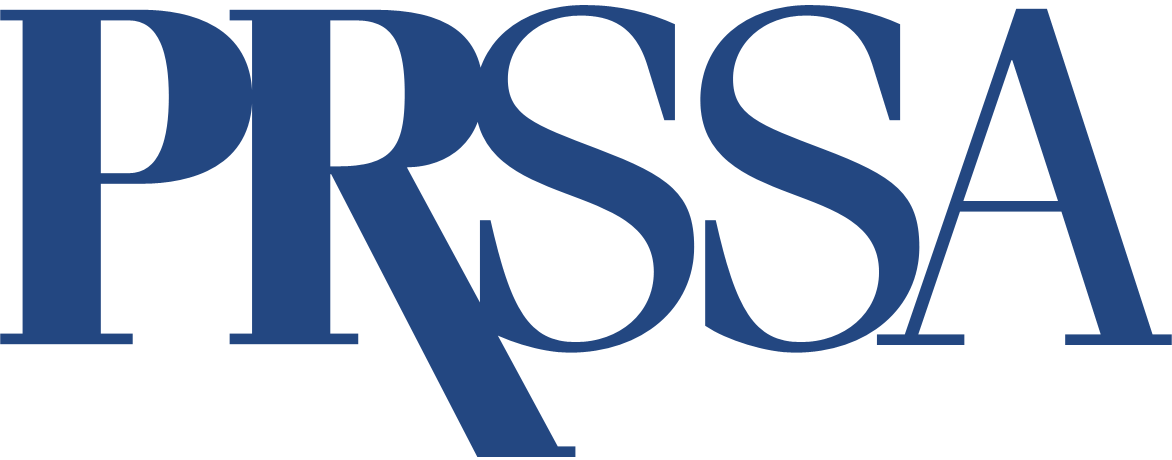
PRSSA
Stockton’s Public Relations Student Society of America (PRSSA) Chapter was established in May 2013. Since that time, Stockton’s PRSSA chapter has become a powerhouse, providing a range of professional enrichment and community engagement opportunities. Each year, PRSSA students organize a series of successful events, including industry tours, guest speakers, workshops, career and alumni panels, and large-scale networking events. These events have helped quickly establish Stockton PRSSA as a strong organization on campus, in the community, and within the national body. PRSSA students also have the opportunity to participate in national conferences. PRSSA is open to all Communication Studies students and students across campus.
